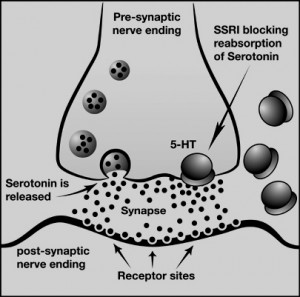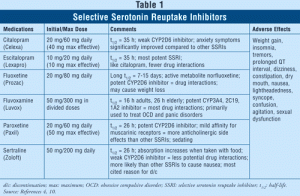SSRIs (selective serotonin reuptake inhibitors) are prescribed antidepressants that are usually prescribed by doctors. They can reduce symptoms of moderate to severe depression, are comparatively safe and usually cause lesser side-effects compared to other antidepressants.
How does selective serotonin reuptake inhibitors work?
SSRIs reduce depression or excess stress by working on the neurotransmitters or chemical messengers in the brain, which communicate between brain cells. SSRIs block the reabsorption or ‘reputake’ of the neurotransmitter serotonin in the brain. Altering the serotonin balance can ease brain cells and they are able to send and receive chemical messages resulting making your mood better. Selective serotonin reuptake inhibitors are called ‘selective’ because they only impact upon the serotonin and not other neurotransmitters in the brain.
Selective serotonin reuptake inhibitors Generic and Brand Names
SSRIs are approved by the Food and Drug Administration as a treatment for depression. Check out the generic names of SSRIs followed by the brand names:
Citalopram (Celexa)
• Sertraline (Zoloft)
• Fluoxetine (Prozac, Prozac Weekly, Sarafem)
• Paroxetine (Paxil, Paxil CR, Pexeva)
• Escitalopram (Lexapro)
• Fluoxetine combined with the atypical antipsychotic olanzapine (Symbyax)
Some SSRIs are in the form of extended-release form or controlled-release referred to as XR or CR. The doctor may also give you SSRIs for treating conditions other than depression.
Selective Serotonin Reuptake Inhibitors side effects
All SSRIs can cause similar side effects. But since every SSRI has a particular chemical buildup, one can cause slightly different set of side-effects from the other: Here are the side-effects of selective serotonin reuptake inhibitors
• Diarrhea
• Headache
• Nausea
• Drowsiness
• Insomnia
• Dry mouth
• Nervousness, agitation or restlessness
• Reduced sexual desire or difficulty reaching orgasm
• Increased sweating
• Inability to maintain an erection (erectile dysfunction)
• Rash
• Weight gain
• Sexual side-effects are the most common form of side-effects in SSRIs and is seen in more than 50 percent of people who take them. Nausea can be controlled if a person is taking extended or controlled release form of SSRIs.
Precautions while taking SSRIs
• Here is when you have to check with the doctor even if he or she prescribes SSRIs
• Pregnancy: If you are pregnant and have been advised to take an SSRI, you have to talk to your doctor or psychiatrist about the possible dangers. Paxil has been singled out for causing increasing birth defects, lung and heart problems. So, if you are breast feeding or pregnant, you may have to check with the doctor about the selective serotonin reuptake inhibitor.
• Blood thinning medications and SSRIs reaction: When combined with an SSRIs, nonsteroidal anti-inflammatory drugs (NSAIDs), aspirin, or anticoagulants like Warfin can increase the risk of bleeding.
• Drug interactions. When taking any antidepressant including selective serotonin reuptake inhibitor , inform your doctor about any other medications or supplements you take. There may be harmful reactions if the drug is mixed with other medicines, supplements or even herbal remedies.
• Serotonin syndrome. Hardly ever, an SSRI leads to hazardously high levels of serotonin. This condition if it happens, is called serotonin syndrome. It usually triggers when two medications that raise serotonin are used together. These can be other antidepressants, drugs for particular health conditions and the herbal supplement St. John’s wort. Serotonin syndrome symptoms or signs include quick or irregular heart rate, confusion, dilated pupils, unconsciousness and fever. Seek out urgebnt medical attention in case there are such signs.
Suicide risk and antidepressants
The Food and Drug Administration (FDA) necessitates that all antidepressants include a warning that some children, adolescents and young adults may be at increased risk of suicide when taking antidepressants. Anyone taking an antidepressant should be monitored closely for unusual, suspicious behavior or worsening depression specially in the first few days after taking the antidepressant. In the long run, antidepressant can reduce suicidal risk because of its mood improving property.
What happens if I stop SSRIs without the doctor’s permission?
SSRIs aren’t addictive. However, if you stop treatment suddenly or miss several doses, there can be withdrawal symptoms like:
• Nausea
• Headache
• Lethargy
• Flu-like symptoms
• Dizziness
It is better to talk to the doctor and end your medicine course properly, in a tapering manner.
Finding the right antidepressant, SSRI
People react differently to a specific antidepressant and can be more prone to side effects from an SSRI type. This means, one particular SSRI may work better for you than the other. Paxil or Paroxetine is a good SSRI to reduce anxiety. Whenever you have to choose an antidepressant like an SSRI, you have to let the doctor know clearly about your side-effects, your bowel movement, other health problems, medications that you are already using etc. In some cases, a combination of antidepressants may work effectively. It has been observed that DNA tests like CYP450 or Cytochrome P450 can tell you which antidepressant can work for you to ease symptoms with no side-effects. Though this test is not used widely, it is becoming quite popular.
It is not so easy to find the best treatment for depression and the doctor may experiment for some weeks to find out the right selective serotonin reuptake inhibitor for you. You just have to have patience and work with your doctor in finding out the correct medicine.



tramadol (Ultracet) you get for treating all sorts of moderate and severe pains. Tramadol (Ultracet) is a medication that originated in Germany and after a long time it was introduced in other countries